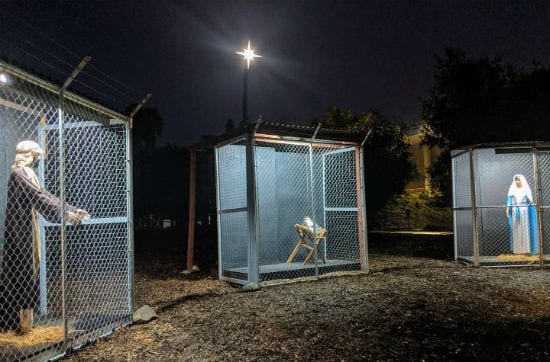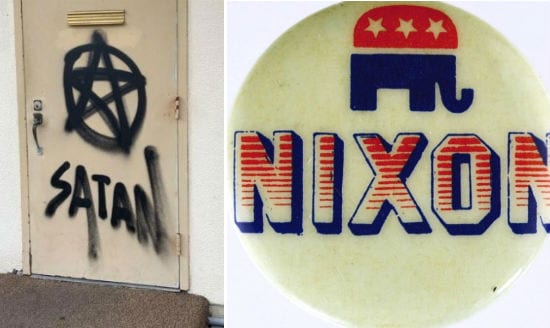Officials at the Defense Department are also said to be "livid," and well aware of the damage that has been done by the incident, according to NBC News' Pentagon reporter Jim Miklaszewski. Speaking on the Imus in the Morning radio/MSNBC program Tuesday , Mr. Miklaszewski said he asked a Pentagon contact about the soldiers alleged to be involved, to which the Pentagon official replied, "You mean the six morons who lost the war?"
That's from Tom Regan in The Christian Science Monitor.
On the one hand, the Pentagon official Miklaszewski cites sticks to the official talking points. The abuse of Iraqi prisoners, he says, was not the result of any official policy or lack thereof, but only reflects the aberrant behavior of "six morons." (This is clearly not the case.)
On the other hand, the official also shockingly employs the past-tense: "the six morons who lost the war."
The L Word — "lost," "lose," "losing" — is popping up all over.
"We are in danger of losing something much more important than just the war in Iraq," New York Times columnist Tom Friedman writes. "We are in danger of losing America as an instrument of moral authority and inspiration in the world."
To avoid losing both, Friedman advocates "a total overhaul" of the Bush administration's Iraq policy. His overhaul begins with firing Defense Secretary Donald Rumsfeld and includes President Bush meeting with "the five permanent members of the U.N. Security Council, the heads of both NATO and the U.N., and the leaders of Egypt, Jordan, Saudi Arabia and Syria" before whom Bush must, "eat crow, apologize for his mistakes and make clear that he is turning a new page."
It's not clear if Friedman realizes just how utterly implausible such a scenario is. If he is correct that this is the only way to avoid losing the war in Iraq, then the past-tense is appropriate — America has lost.
Following the release of photos from Abu Ghraib, Juan Cole wrote:
I really wonder whether, with the emergence of these photos, the game isn't over for the Americans in Iraq. Is it realistic, after the bloody siege of Fallujah and the Shiite uprising of early April, and in the wake of these revelations, to think that the U.S. can still win the hearts and minds of the Iraqi Arab public?
Tom Ricks, in Sunday's Washington Post, finds the L Word on the lips of top defense strategists inside and outside of the military:
Deep divisions are emerging at the top of the U.S. military over the course of the occupation of Iraq, with some senior officers beginning to say that the United States faces the prospect of casualties for years without achieving its goal of establishing a free and democratic Iraq.
Their major worry is that the United States is prevailing militarily but failing to win the support of the Iraqi people. That view is far from universal, but it is spreading and being voiced publicly for the first time.
Ricks cites:
1. Army Maj. Gen. Charles H. Swannack Jr., the commander of the 82nd Airborne Division, who, "when asked whether he believes the United States is losing" said, "I think strategically, we are."
2. Army Col. Paul Hughes, a former director of planning for the CPA in Baghdad, tells Ricks, "Unless we ensure that we have coherency in our policy, we will lose strategically." Hughes compares the Iraq war to Vietnam: "Here I am, 30 years later, thinking we will win every fight and lose the war, because we don't understand the war we're in."
3. A "senior general at the Pentagon" says, "It is doubtful we can go on much longer like this" and calls for the heads of Rumsfeld and his deputy, Paul Wolfowitz.
4. Rep. John P. Murtha, D-Pa., a hawkish former Marine, said "We cannot prevail in this war as it is going today."
5. Larry Diamond, a former "senior political adviser of the U.S. occupation authority in Iraq," says the U.S. is not losing — yet, " … we are no longer clearly winning the peace, and … a successful transition to democracy is in doubt."
Unlike the first Gulf War, this war lacks a clear, measurable and exclusively military objective. The enterprise is too murky to easily measure whether America is, in fact, winning or losing, or even to know what "victory" or "defeat" might look like.
Paul Reynolds of BBC News quotes Charles Heyman, of Jane's Consultancy Group, describing what seems the likeliest scenario for the next few months:
"It begins to look as though there is going to be a rather messy political solution to the whole affair, possibly brokered by the United Nations.
"Expect to see an agreement where both sides can claim some sort of a victory, followed by a rather hasty withdrawal of coalition troops at some stage in the next six months."
A messy political solution followed by a hasty withdrawal. That doesn't sound exactly like defeat, but it sure doesn't sound like victory either.
(p.s. — added Roger Ailes link)












